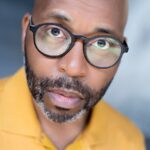By Amanda Heisey

Pass Over by Antoinette Nwandu is a gripping, emotional and lyrical piece of theatre. Running November 10 through 19 and closing out the new Sidebar Series at The Sarasota Players, this intense ride is important and more than meets the eye. Learn more about it directly from The Players Artistic Director Steven H. Butler, who also directed and selected the show.
Amanda: Please give me an elevator pitch of the show.
Steven: Moses and Kitch are two young Black in an urban city facing monumental challenges and obstacles in everyday life. In their dream life, they talk about what life is going to be like in the Promise Land…not necessarily Heaven but any other place than where they are.
A: In your mind, why is it important? Why are we telling this story right now?
S: Various marginalized groups continue to struggle trying to navigate through and establish themselves in our country. For many, it becomes a disparities-juggling act: education, medical, social justice, economic. Yes, progress has been made; however, in our Post 2020 Social Awareness world even more progress has to be made in order to build a more just and equitable world. As a society, we have to be ready and willing to have difficult conversations and be cognizant not to put a bandage on the wound and think that everything will be okay.
A: What has been your favorite part of working on this production?
S: Due to the sensitivity of the play’s topic, it was imperative to create a safe and supportive culture for the actors and production team. During the first week of rehearsal, we engaged in valuable tablework (reading script, discussing and building characters, and discussing personal life experiences as it related to the story). It was clear that said tablework would continue challenging the actors and production team to face both personal and social demons. Therefore, our rehearsal routine always began with personal checking-in time which allowed the individual to shed the day’s events; and again, all rehearsals ended at the table to allow individuals to release issues or thoughts that were not necessary to take home. This simple technique established great safety and value for everyone involved.
A: What was the most challenging part of working on this show?
S: I would say the most challenging part was getting out of my own head. The artist has to allow self to be vulnerable and stop sending negative messages to self and remember that even though some people will not be willing to hear the message, there are many more who are willing and even hungry to hear the message.
A: Tell the community why they should come see the show.
S: Everyone has biases; therefore, everyone should come see this show. Within the context of what is happening in the main characters’ world, it has been happening for generations. For those of us who may be removed from such disparities as mentioned earlier, it is sometimes easy to distance ourselves and form biased opinions about the situations and those affected by it. I like to invite the audience to come with a clear mind and see these characters as human beings with hopes, dreams and the desire to be loved just like those around us in real life.
A: Give me three words that describe this show.
S: Raw, real, challenging
A: In your opinion, why is live theatre so important?
S: The importance of live theatre is crucial to the ever-evolving human experience. Through this ephemeral art form audience members have an opportunity to utilize all their senses and form some takeaways that benefit their own personal and social development.
A: Tell the community why they should get involved with The Players.
S: When people come together for a common cause, they are building community. They bring to the union various skill sets and life experiences, and that’s exactly what is valuable to us at The Sarasota Players. Time! It is the greatest valuable asset our volunteers share with us and is greatly appreciated.
A: Is there anything else you’d like to add?
S: This play is charged with a great deal of adult language and there are very serious issues that come to the surface. I invite the audience to remove their blinders and look past the trees (the language) in order to see the forest (social issues and the human condition).